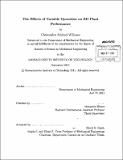The effects of variable operation on RO plant performance
Author(s)
Williams, Christopher Michael, S.M. Massachusetts Institute of Technology
DownloadFull printable version (7.647Mb)
Alternative title
Effects of variable operation on reverse osmosis plant performance
Other Contributors
Massachusetts Institute of Technology. Dept. of Mechanical Engineering.
Advisor
Alexander Mitsos.
Terms of use
Metadata
Show full item recordAbstract
Optimizations of reverse osmosis (RO) plants typically consider steady state operation of the plant. RO plants are subject to transient factors that may make it beneficial to produce more water at one time than at another. These factors can impact the optimal size of the plant. The electricity price is one factor of importance. When long periods of time are considered, other factors such as weather and seasonal water demand can influence the operation and size as well. With long-term operation, water storage is possibile. This thesis investigates the optimal time-varying operation and size of a single stage RO plant subject to a time-varying electricity price. A single stage RO model is modified to include a variable plant size controlled by the number of modules. The annual capital and operating expenses of the plant are calculated in an RO economics sub-model. In one study, the short-term (single day) operation and design are optimized to minimize the total annualized cost of the plant. The operation and size are optimized for four different electricity price functions: constant, moderately fluctuating, highly fluctuating, and actual electricity prices. The results show that significant savings (1-7%) are obtainable and optimal oversizing of 15% is chosen for the fluctuating electricity price functions considered therein. The plant produces more water when electricity is cheap, and shuts off during periods of high electricity price when oversized. The size and day-by-day operation are optimized for one year subject to Spain's electricity price. Little savings and oversizing are obtainable for the day-by-day optimization due to low fluctuations in the electricity price during the year. In a second study, the long-term (one year) operation with storage of product water is optimized to minimize the cumulative cost of reclaiming the water from the reservoir and/or of the electricity. The operation is optimized for electricity prices for California, Cyprus, Greece and Spain for 2010. Low savings are obtained with variable operation. Shutting off is not chosen in the optimal operation and 1% oversizing typically leads to increased costs. Lower electricity prices with more fluctuations result in better savings. Product water is stored during the winter.
Description
Thesis (S.M.)--Massachusetts Institute of Technology, Dept. of Mechanical Engineering, 2011. Cataloged from PDF version of thesis. Includes bibliographical references (p. 113-117).
Date issued
2011Department
Massachusetts Institute of Technology. Department of Mechanical EngineeringPublisher
Massachusetts Institute of Technology
Keywords
Mechanical Engineering.